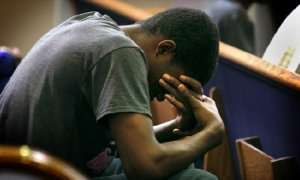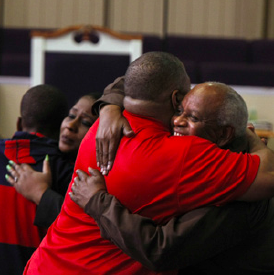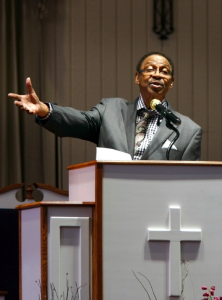Memphis church creates ‘emotional fitness center’ after member’s suicide
By David Waters
Early one Monday morning before Easter, a depressed, middle-aged woman stood holding a pistol under the 20-foot cross that hangs above the entrance of the Healing Center Full Gospel Baptist Church. There, she took her life.
The church member’s shocking suicide, the morning after she asked for help and promised to start counseling, sent the congregation and its husband and wife co-pastors into a period of mourning, finger-pointing and soul-searching.
“People were confused, angry, ashamed,” said co-pastor Dr. William Young (in photo above). “Many members blamed the church for not recognizing this was going to happen. We were forced to confront the myth that black people don’t commit suicide, and the stigma surrounding mental health in the African-American church.”
The 40-year-old woman’s death in 2002 led Young, a licensed pastoral counselor, and his wife and co-pastor, Rev. Dianne Young, to reimagine their ministry, which already was one of the city’s most influential faith-based counseling centers.
Raising awareness and access
In 2003, they organized the first National Suicide and the Black Church Conference. About 50 people attended. Ten years later, more than 500 attended the conference, held every other year at the University of Tennessee Health Sciences Center in Memphis.
 In 2008, the Youngs took an even more innovative approach to raising awareness and increasing access to mental health care in the African-American community. They opened the Emotional Fitness Center, a network of state-funded, church-based counseling centers that provide free mental health screenings, support groups, access to nurse practitioners and referrals to Memphis-area mental health services.
In 2008, the Youngs took an even more innovative approach to raising awareness and increasing access to mental health care in the African-American community. They opened the Emotional Fitness Center, a network of state-funded, church-based counseling centers that provide free mental health screenings, support groups, access to nurse practitioners and referrals to Memphis-area mental health services.
The centers, located at the Healing Center and six other African-American churches in Memphis, have screened and triaged 2,500 people. Each church employs one to four peer advocate liaisons (PALs) who are trained to screen for emotional and behavioral disorders.
Referrals come from churches and counseling centers, as well as local public school districts, the county public defender’s office, juvenile court, and other public and nonprofit partners.
“The Youngs have done more than anyone in Memphis, and maybe anyone in the black church, to remove the stigma from mental health,” said Dr. Altha Stewart, a Memphis psychiatrist and founder of the Just Care Family Network, a federally funded center for youths with diagnosed emotional and behavioral disorders.
“They have figured out how to use the credibility and authority of the church to help people understand that mental illness isn’t the result of some spiritual shortcoming or character flaw. It’s a real illness that can be treated, and recovery is possible.”
William Young became the first African-American chaplain at Methodist HealthCare in Memphis in 1981.
Dianne Young left a 20-year career with the U.S. Postal Service to join her husband as co-pastor when the Healing Center opened in 1991.
Everyone wants to be fit
 The Youngs faced a naming dilemma when they started thinking about opening a church-based mental health ministry in 2006. Churches have physical fitness centers, Young thought. Why not an emotional fitness center?
The Youngs faced a naming dilemma when they started thinking about opening a church-based mental health ministry in 2006. Churches have physical fitness centers, Young thought. Why not an emotional fitness center?
“We knew it couldn’t have the word ‘mental’ in it,” William Young said. “People in the African-American community especially hear the word ‘mental’ and go, ‘Oh, no, that’s not me. I’m not crazy.’ The word ‘emotional’ doesn’t have that stigma attached to it. And everyone wants to be ‘fit.’”
The Youngs believe the concept of “emotional fitness” gives people permission to seek it and want it rather than shrink from it and avoid it. It’s not churchy enough to drive away those who have been damaged by church. But its church-based location gives comfort to those who might be reluctant to seek psychiatric care.
If you break your heart or mind
That’s how Tammie Walker-Smith felt when she heard the Youngs counseling another pastor and his wife on their weekly radio talk show, “On the Road to Healing,” which they’ve hosted for 23 years on a local AM Christian station.
Walker-Smith said she was sexually abused by her church’s pastor when she was 14 and again when she was 16. After the first time, she told her mother, who claimed she didn’t know and was devastated. The second time, Walker-Smith said, her mother not only knew; she eventually married the pastor.
“I wanted to kill myself,” Walker-Smith said. “I felt like it was my fault. I didn’t know who to tell or what to do. I didn’t feel like I could go to the church, but I was afraid to go anywhere else. When I heard the Youngs counseling another pastor, I felt like I’d found someone I could trust.”
Walker-Smith said the counseling and subsequent medication she received not only helped her recover from her trauma and depression, but the Youngs “helped me to be able to pray again and to realize God had nothing to do with what happened to me.”
Now 52, Walker-Smith is married and has four stepchildren and a grandchild. She teaches them about the value of emotional fitness.
“If you break a leg, you seek medical care,” she said. “You need to do the same if you break your heart or your mind.”
That’s a message the Youngs continue to preach and practice. That mental health and emotional fitness is just as important, and requires the same personal and medical attention, as physical health and fitness. That the community must understand the connections between mental health and family dysfunction, abuse, crime and violence. That the church is called to be a healing center for the heart, mind and soul.
“Mental health care gives people hope,” William Young said, “and the church is in the hope business.”

